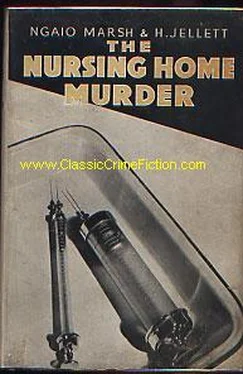Ngaio Marsh - The Nursing Home Murder
Здесь есть возможность читать онлайн «Ngaio Marsh - The Nursing Home Murder» — ознакомительный отрывок электронной книги совершенно бесплатно, а после прочтения отрывка купить полную версию. В некоторых случаях можно слушать аудио, скачать через торрент в формате fb2 и присутствует краткое содержание. Жанр: Классический детектив, на английском языке. Описание произведения, (предисловие) а так же отзывы посетителей доступны на портале библиотеки ЛибКат.
- Название:The Nursing Home Murder
- Автор:
- Жанр:
- Год:неизвестен
- ISBN:нет данных
- Рейтинг книги:5 / 5. Голосов: 1
-
Избранное:Добавить в избранное
- Отзывы:
-
Ваша оценка:
- 100
- 1
- 2
- 3
- 4
- 5
The Nursing Home Murder: краткое содержание, описание и аннотация
Предлагаем к чтению аннотацию, описание, краткое содержание или предисловие (зависит от того, что написал сам автор книги «The Nursing Home Murder»). Если вы не нашли необходимую информацию о книге — напишите в комментариях, мы постараемся отыскать её.
The Nursing Home Murder — читать онлайн ознакомительный отрывок
Ниже представлен текст книги, разбитый по страницам. Система сохранения места последней прочитанной страницы, позволяет с удобством читать онлайн бесплатно книгу «The Nursing Home Murder», без необходимости каждый раз заново искать на чём Вы остановились. Поставьте закладку, и сможете в любой момент перейти на страницу, на которой закончили чтение.
Интервал:
Закладка:
The telephone rang and Alleyn answered it.
“It’s Mr. Rattisbon. Go down and make much of him, Fox. Bring him up tenderly, treat him with care. If he’s anything like the rest of his family, he’ll need warming. Use your celebrated charm.”
“O.K.” said Fox. “ Toojoor la politesse . I’m on to the third record now, chief, but their peculiar ways of pronunciation give me a lot of trouble. Still, it’s a sort of hobby, as you might say.”
He sighed and went out, returning to usher in Mr. James Rattisbon, of Knightley, Knightley and Rattisbon, uncle to Lady O’Callaghan and solicitor to the deceased and his family. Mr. Rattisbon was one of those elderly solicitors whose appearance explains why the expression “dried-up” is so inevitably applied by novelists to men of law. He was desiccated. He was dressed in clothes of a dated type that looked rather shabby, but were actually in good repair. He wore a winged collar, rather high, and a dark tie, rather narrow. He was discreetly bald, somewhat blind, and a little tremulous. He had a kind of quick stuttering utterance, and a curious trick of thrusting out his pointed tongue and rattling it exceedingly rapidly between his thin lips. This may have served as an antidote to the stutter or it may have signified a kind of professional relish. His hands were bird-like claws with very large purplish veins. It was impossible to picture him in any sort of domestic surroundings.
As soon as the door had been closed behind him he came forward very nimbly and said with incredible speed:
“Chief Detective-Inspector Alleyn?”
“Good morning, sir,” said Alleyn. He advanced a chair towards Mr. Rattisbon and offered to take his hat.
“Good morning, good morning,” said Mr. Rattisbon. “Thank-yer, thank-yer. No, thank-yer. Thank-yer.”
He clung to his hat and took the chair.
“It’s good of you to call. I would have been delighted to save you the trouble by coming to your office. I believe you want to see me about the O’Callaghan business?”
“That is the business — that is the reason — it is in connection with that matter that I have waited upon you, yes,” rattled Mr. Rattisbon. He stopped short, darted a glance at Alleyn, and beat a finicky tattoo on the crown of his hat.
“Oh yes,” said Alleyn.
“As no doubt you are aware, Inspector Alleyn, I was the late Sir Derek O’Callaghan’s solicitor. I am also his sister’s, Miss Catherine Ruth O’Callaghan’s, solicitor, and of course his wife’s — his wife’s — ah, solicitor.”
Alleyn waited.
“I understand from my clients that certain representations made by Lady O’Callaghan were instrumental in prompting you to take the course you have subsequently adopted.”
“Yes.”
“Yes. I understand that is the case. Inspector Alleyn, this is not, strictly speaking, a professional call. Lady O’Callaghan is my niece. Naturally I have a personal as well as a professional interest in the matter.”
He looked, thought Alleyn, as though he was incapable of any interest that was not professional.
“Of course, sir,” said Alleyn.
“My niece did not consult me before she took this step. I must confess that had she done so I should— I should have entertained grave doubts as to the advisability of her action. However, as matters have turned out, she was fully justified. I was, of course, present at the inquest. Since then I have had several interviews with both these ladies. The last took place yesterday afternoon and was — was of a somewhat disquieting nature.”
“Really, sir?”
“Yes. It is a matter of some delicacy. I have hesitated — I have hesitated for some time before making this appointment. I learn that since the inquest Miss O’Callaghan has visited you and has — has suggested that you go no further with your investigation.”
“Miss O’Callaghan,” said Alleyn, “was extremely distressed at the idea of the post-mortem.”
“Quite. Quite so. It is at her request that I have come to see you myself.”
“Is it, by Jove!” thought Alleyn.
“Miss O’Callaghan,” continued Mr. Rattisbon, “fears that in her distress she spoke foolishly. I found it difficult to get from her the actual gist of her conversation, but it seems that she mentioned a young protégé of hers, a Mr. Harold Sage, a promising chemist, she tells me.”
“She did speak of a Mr. Sage.”
“Yes.” Mr. Rattisbon suddenly rubbed his nose very hard and then agitated his tongue. “She appears to think she used somewhat ambiguous phrasing as regards the young man, and she — in short, inspector, the lady has got it into her head that she may have presented him in a doubtful light. Now I assured her that the police are not to be misled by casual words spoken at a time of emotional stress, but she implored me to come and see you, and though I was disinclined to do so, I could scarcely refuse.”
“You were in a difficult position, Mr. Rattisbon.”
“I am in a difficult position. Inspector Alleyn, I feel it my duty to warn you that Miss Ruth O’Callaghan, though by no means non compos mentis , is at the same time subject to what I can only call periods of hysterical enthusiasm and equally hysterical depression. She is a person of singularly naïve intelligence. This is not the first occasion on which she has raised an alarm about a matter which subsequently proved to be of no importance whatever. Her imagination is apt to run riot. I think it would not be improper to attribute this idiosyncrasy to an unfortunate strain in her heredity.”
“I quite appreciate that,” Alleyn assured him. “I know something of this family trait. I believe her father— ”
“Quite so. Quite,” said Mr. Rattisbon, shooting a shrewd glance at him. “I see you take my point. Now, Inspector Alleyn, the only aspect of the matter that causes me disquietude is the possibility of her calling upon you again, actuated by further rather wild and, I’m afraid, foolish motives. I did think that perhaps it would be well to— ”
“To put me wise, sir? I’m grateful to you for having done so. I should in any case have called on you, as I shall be obliged to make certain inquiries as regards the deceased’s affairs.”
Mr. Rattisbon appeared to tighten all over. He darted another glance at the inspector, took off his glasses, polished them, and in an exceedingly dry voice said:
“Oh, yes.”
“We may as well get it over now. We have not yet got the terms of Sir Derek’s will. Of course, sir, we shall have to know them.”
“Oh, yes.”
“Perhaps you will give me this information now. Just the round terms, you know.”
It is perfectly true that people more often conform to type than depart from it. Mr. Rattisbon now completed his incredibly classical portrait of the family lawyer by placing together the tips of his fingers. He did this over the top of his bowler. He then regarded Alleyn steadily for about six seconds and said:
“There are four legacies of one thousand pounds each and two of five hundred. The residue is divided between his wife and his sister in the proportion of two-thirds to Lady O’Callaghan and one-third to Miss Catherine Ruth O’Callaghan.”
“And the amount of the entire estate? Again in round terms?”
“Eighty-five thousand pounds.”
“Thank you so much, Mr. Rattisbon. Perhaps later on I may see the will, but at the moment that is all we want. To whom do the legacies go?”
“To the funds of the Conservative Party, to the London Hospital, to his godchild, Henry Derek Samond, and to the Dorset Benevolent Fund, one thousand in each instance. To Mr. Ronald Jameson, his secretary, five hundred pounds. To be divided among his servants in equal portions of one hundred each, the sum of five hundred pounds.”
Читать дальшеИнтервал:
Закладка:
Похожие книги на «The Nursing Home Murder»
Представляем Вашему вниманию похожие книги на «The Nursing Home Murder» списком для выбора. Мы отобрали схожую по названию и смыслу литературу в надежде предоставить читателям больше вариантов отыскать новые, интересные, ещё непрочитанные произведения.
Обсуждение, отзывы о книге «The Nursing Home Murder» и просто собственные мнения читателей. Оставьте ваши комментарии, напишите, что Вы думаете о произведении, его смысле или главных героях. Укажите что конкретно понравилось, а что нет, и почему Вы так считаете.











